How To Update Java On Ubuntu
Introduction
Java is one of the most popular programming languages. It is used for developing annihilation from lightweight mobile to desktop applications.
This step-by-step guide will bear witness you how simple it is to install Java on Ubuntu xviii.04 or 20.04.
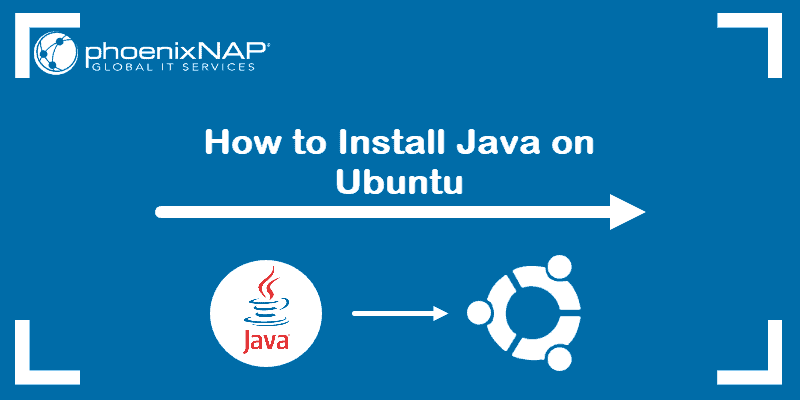
Prerequisites
- A user account with sudo privileges
- Access to the command-line/terminal window
- The apt (apt-get) command
Java Versions
There are iv Coffee platforms available:
- Java Standard Edition (Coffee SE)
- Coffee Micro Editions (Coffee ME)
- Java Enterprise Edition (Coffee EE)
- JavaFX
In this document, nosotros wait at different packages within the Coffee SE.
The Ubuntu repository offers two (2), open-source Coffee packages, Java Development Kit (Open JDK) and Java Runtime Environment (Open JRE). You utilize JRE for running Java-based applications, while JDK is for developing and programming with Coffee.
Also available is Oracle Java, some other SE implementation, which has boosted commercial features. You can find the official Oracle JDK through a third-party repository. Even so, comport in mind the license just allows non-commercial use of the software.
Installing Java on Ubuntu
You can install one or several Java packages. You tin can as well decide which version y'all want on your organisation by installing a specific version number. The current default and LTS version is Java 11.
Install OpenJDK
ane. Open the terminal (Ctrl+Alt+T) and update the packet repository to ensure you download the latest software version:
sudo apt update 2. Then, you tin confidently install the latest Coffee Evolution Kit with the following control:
sudo apt install default-jdk 3. Ostend the installation by typing y (yep) and printing Enter.
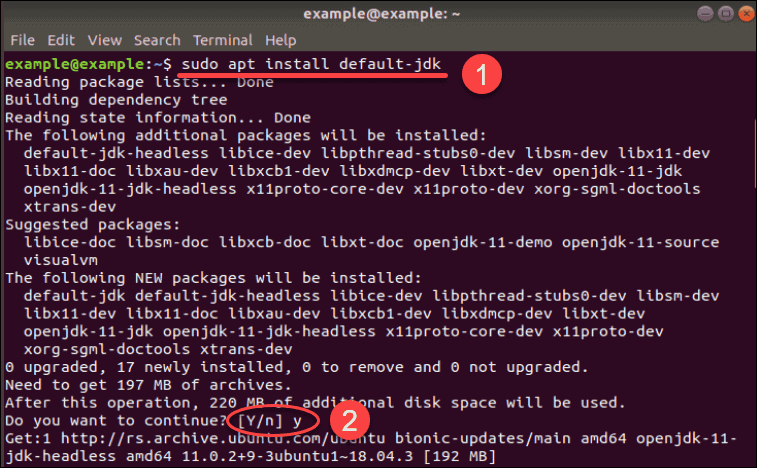
Install OpenJRE 11
i. Earlier you install the Java Runtime Environment, make sure y'all update the repository with:
sudo apt update two. Next, type in the post-obit command to download and install Java RE:
sudo apt install default-jre Type y (yes) and press Enter to confirm the installation.
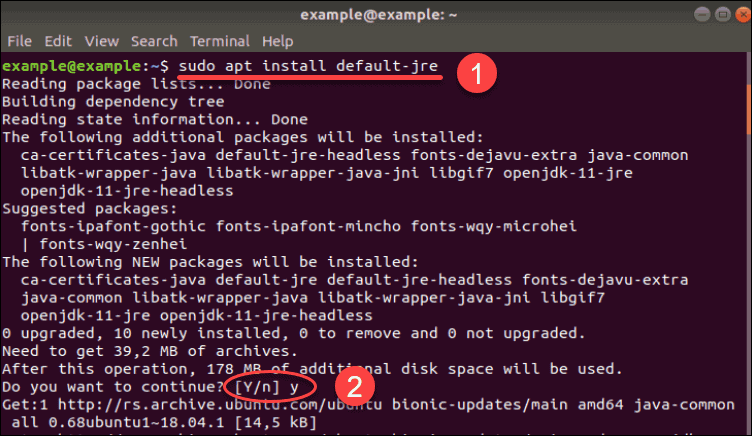
Install Oracle Coffee 11
To download the official Oracle JDK, you first need to download a tertiary-party repository.
Nosotros include instructions for installations from ii (two) unlike bundle repositories. You can decide from which one you adopt to download.
Option 1: Download Oracle Java from Webupd8 PPA
i. Starting time, add the required package repository by typing:
sudo add-apt-repository ppa:webupd8team/java Hit Enter when prompted.
2. Brand certain to update your arrangement before initiating whatever installation:
sudo apt update three. Now, yous can install Coffee xi, the latest LTS version:
sudo apt install oracle-java11-installer 4. Optionally, you tin set this Java version as the default with the following command:
sudo apt install oracle-java11-set-default Option 2: Download Oracle Coffee from Linux Uprising PPA
1. Before calculation the new repository, install the required packages if you lot practice not have them on your organisation yet:
sudo apt install software-backdrop-common 2. Next, add together the repository with the post-obit command:
sudo add-apt-repository ppa:linuxuprising/coffee iii. Update the bundle listing earlier installing whatsoever new software with:
sudo apt update 4. Then, download and install the latest version of Oracle Java (version number eleven):
sudo apt install oracle-java11-installer Verify Java is Installed on Your System
Now verify whether the software is part of your organisation.
To check the version of Java running, use the command:
java –version The successful installation of Java on Ubuntu will output details, as in the image below.

If there is no Java version, the system will say information technology is unable to discover the software.

Install Specific Version of Java
If for some reason you do not wish to install the default or latest version of Coffee, yous can specify the version number you prefer.
Install Specific Version of OpenJDK
You may decide to use Open JDK 8, instead of the default OpenJDK 11.
To do and so, open the terminal and type in the following control:
sudo apt install openjdk-eight-jdk 
Verify the version of java installed with the command:
java –version 
Install Specific Version of Oracle Java
When y'all download the Oracle Java packages from a tertiary-political party repository, you have to type out the version number equally role of the code.
Therefore, if you want other versions of Java Oracle on your system, alter that number accordingly.
The control for installing Oracle JDK is the following (the symbol # representing the Java version):
sudo apt install oracle-java#-installer For instance, if you desire to install Java 10, use the command:
sudo apt install oracle-java10-installer 
How to Prepare Default Java Version
As you can take multiple versions of Java installed on your organization, you can determine which one is the default one.
First, run a command that shows all the installed versions on your estimator:
sudo update-alternatives --config coffee 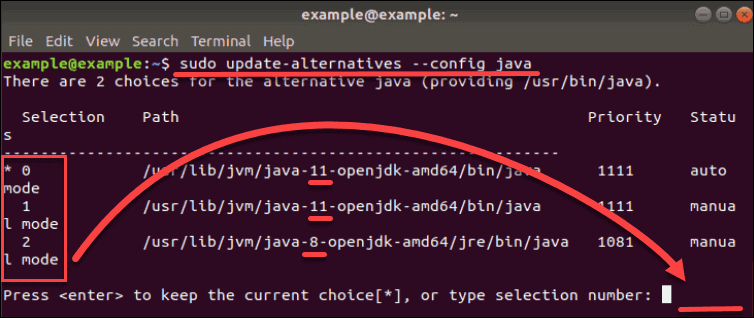
The prototype above shows that at that place are two alternatives on this arrangement. These choices are represented past numbers 1 (Java eleven) and two (Java viii), while the 0 refers to the current default version.
Every bit the output instructs, you lot can modify the default version if you lot type its associated number (in this case, 1 or ii) and press Enter.
How to Gear up JAVA_HOME Surround Variable
The JAVA_HOME environment variable determines the location of your Java installation. The variable helps other applications access Java'south installation path hands.
1. To prepare the JAVA_HOME variable, you offset demand to find where Java is installed. Apply the following command to locate information technology:
sudo update-alternatives --config java 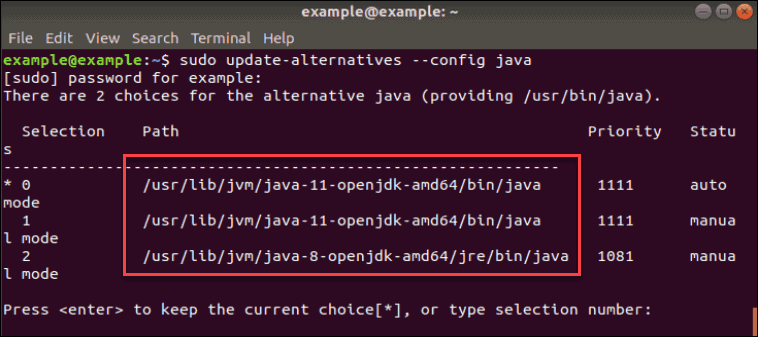
The Path section shows the locations, which are in this case:
- /usr/lib/jvm/coffee-eleven-openjdk-amd64/bin/java (where OpenJDK 11 is located)
- /usr/lib/jvm/java-8-openjdk-amd64/jre/bin/java (where OpenJDK 8 is located)
2. Once you run across all the paths, re-create 1 of your preferred Java version.
3. Then, open up the file /etc/surroundings with any text editor. In this example, we use Nano:
nano /etc/environment four. At the end of the file, add a line which specifies the location of JAVA_HOME in the following manner:
JAVA_HOME="/your/installation/path/" For example, if we copied the installation path for Coffee 11 in the previous stride, the added line in the text code editor would be:

How to Uninstall Java on Ubuntu
In instance you need to remove whatsoever of the Coffee packages installed, use the apt remove command.
To remove Open JDK 11, run the command:
sudo apt remove default-jdk To uninstall OpenJDK eight:
sudo apt remove openjdk-8-jdk In one case you lot run the command, confirm the continuation of the process by pressing y (yes) and the packages will be removed.
Note: Refer to our comprehensive breakdown of All-time Java IDEs to find the best ane for your needs.
Conclusion
This guide has shown you how to install Coffee on Ubuntu xviii.04. Information technology also instructed you on how to modify the default version and set the home environment variable.
Now, yous are prepare to use the powerful Java platform!
For more than tutorials on how to install Java on other systems, make sure to read our article on how to install Java on Windows.
Was this article helpful?
Yeah No
Source: https://phoenixnap.com/kb/how-to-install-java-ubuntu
Posted by: millerprioner1938.blogspot.com


0 Response to "How To Update Java On Ubuntu"
Post a Comment